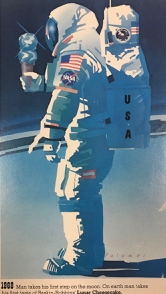No products in the cart.
Posts
Making Better Career Choices
 If you were to ask most young children what their career will be when they grow up, you’d get a fairly predictable set of answers: Policeman, fireman, teacher, cook, dancer, or something along those lines.
If you were to ask most young children what their career will be when they grow up, you’d get a fairly predictable set of answers: Policeman, fireman, teacher, cook, dancer, or something along those lines.
Me? I wanted to be an ice cream man. On the moon.
In fairness, I was born in 1967, at the tail end of the great Space Race. Men started landing on the moon when I was two years old, and it happened on a regular basis for a few years beyond that. So, life on the moon was very much a focus on public discussion. And, in fact, Baskin Robbins even launched a Lunar Cheesecake flavor after the first landing, so you can see in retrospect how I might have arrived at that career choice.
While a select few of us go on to pursue the occupation we dreamed of as a child, most of us change our career aspirations many times as we grow older. (I actually still would like to be an ice cream man on the moon, but the business classes I took later in life made me realize it’s probably a bad move financially.) And, why do we keep changing what we want to do? It’s because we learn more about ourselves and, at the same time, we learn more about our options.
Of course, for most of us that happens by chance: We figure out our strengths and interests on our own, and we are organically exposed to more and more careers, sometimes through friends and acquaintances, and a lot of times through media. The media part is slightly concerning, since they tend to sensationalize many professions. And the reality is that this organic process simply doesn’t allow us to uncover and explore many occupations that might be a great fit.
That’s what I love about the focus on career exploration in CTE. It recognizes the importance of being exposed to lots of professions and, at the same time, provides opportunities for young people to think about their strengths, interests, and talents, and how those relate to future opportunities. So, even those people who start out with wholly unrealistic aspirations – like being an ice cream man on the moon – have an opportunity to look at a wider array of paths.
And, to that end, NC3T has a couple of new resources for those who want to help students along their own career exploration journeys. One is a set of resources to help all teachers – your math teacher, history teacher, and other core content educators – to incorporate career content across the curriculum. It’s called CareerSmart Classrooms, and it provides those educators with not only the content, but also the understanding of how and why to help students make these connections. The other is called CareerSmart Essentials; it’s a 10+ hour online course to help students develop the essential tools to plan for career, college, and life; being wholly online and self-guided, it’s a perfect resource for students learning from home.
Brett Pawlowski is Executive Vice President of NC3T, the National Center for College and Career Transitons (www.nc3t.com). NC3T provides planning, coaching, technical assistance and tools to help community-based leadership teams plan and implement their college-career pathway systems and strengthen employer connections with education.

